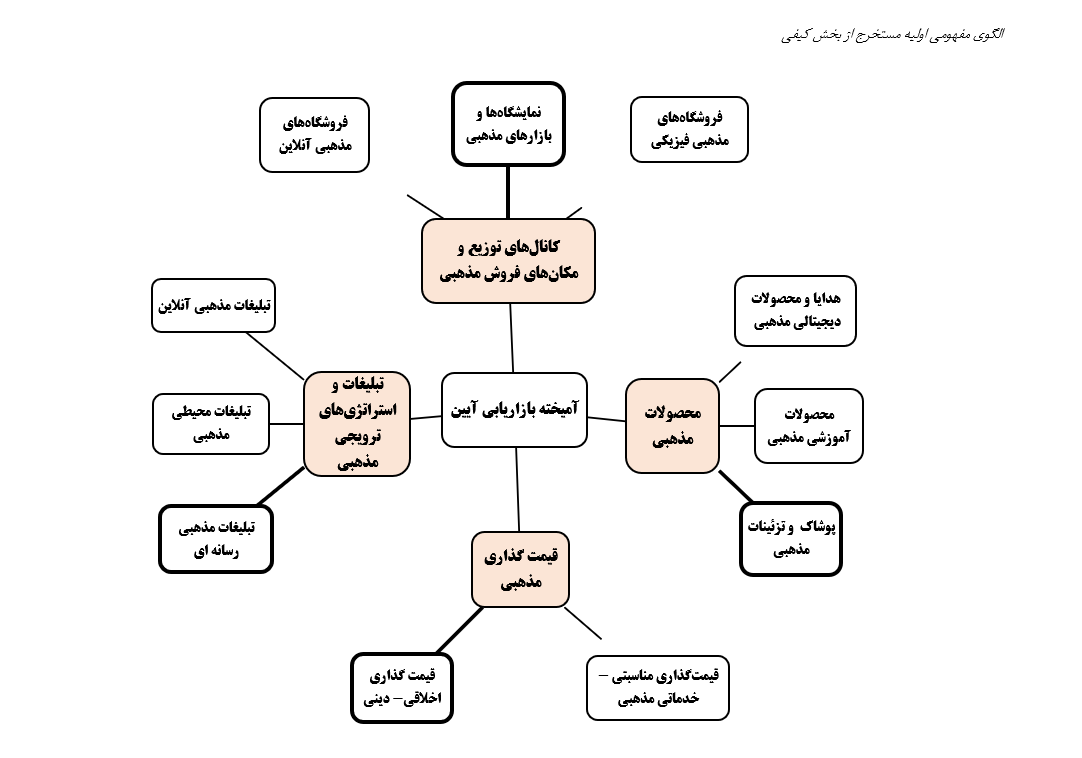طراحی مدل آمیخته بازاریابی آیین با روش تحلیل مضمون
کلمات کلیدی:
بازاریابی, بازاریابی آیین, مذهب, آمیخته بازاریابی آیینچکیده
هدف پژوهش طراحی مدل آمیخته بازاریابی آیین است. پژوهش حاضر با رویکردی کیفی و از نظر هدف جزو پژوهشهای کاربردی و با استفاده از روش تحلیل مضمون انجام شد. خبرگان شامل اساتید هیئتعلمی و همچنین مدیران ارشد بودند و همچنین مصاحبه شوندگان شامل، 15 نفر که به روش نمونهگیری هدفمند تا رسیدن به سطح اشباع نظری انتخاب شدند. دادهها با استفاده از مصاحبه نیمه ساختاریافته گردآوری شد. برای اطمینان از روایی و پایایی، یافتهها به تایید مصاحبه شوندگان رسید. به منظور تحلیل دادهها نیز از روش براون و کلارک با نرم افزار مکس کیودآ انجام گردید. یافتهها حاصل از تحلیل مصاحبه شامل 1 مضمون فراگیر، 4 مضمون سازمان یافته و 11 مضمون پایه و 63 کد اولیه برای طراحی مدل شناسایی شدهاند. نتایج نیز نشان داد امیخته بازاریابی آیین به سازمانهای مذهبی و نهادهای دینی این امکان را میدهد که برنامهها و خدمات مذهبی خود را به شیوهای مؤثرتر ارائه دهند و به نیازها و خواستههای جامعه دینی پاسخ دهند. با در نظر گرفتن عناصر مختلف امیخته بازاریابی و تطبیق آنها با خصوصیات خاص محیطهای مذهبی، میتوان به بهبود کیفیت و اثربخشی فعالیتهای مذهبی کمک کرد. به این ترتیب، بازاریابی مذهبی میتواند نقش مهمی در ارتقاء و گسترش فعالیتهای دینی و افزایش مشارکت اعضای جامعه داشته باشد.
دانلودها
مراجع
Abraham, J. E., & Simatupang, P. (2023). Rapid Deployment and Operation of Faith-Based Digital Social Innovation. Asian
Journal of Management, Entrepreneurship and Social Science, 3(01), 382-404.
https://ajmesc.com/index.php/ajmesc/article/view/268
Agheli, M., NikMenesh, S., Rashidi, H., & Jalali, P. (2023). Training on Thesis Writing and Scientific Article Writing.
Dibagaran Book Institute.
Al Jabouri, A. A. N., & Al-Yasiri, N. H. (2022). Marketing religious tolerance and its role in peaceful coexistence between
religions and its impact on the local economy is an applied study in Iraq. Ishtar Journal of Economics and Business Studies
(IJEBS), 3(1), 1-14.
nce_between_religions_and_its_impact_on_the_local_economy_is_an_applied_study_in_Iraq
Altay, B. C., Okumuş, A., & Adıgüzel Mercangöz, B. (2022). An intelligent approach for analyzing the impacts of the COVID19 pandemic on marketing mix elements (7Ps) of the on-demand grocery delivery service. Complex & Intelligent Systems,
(1), 129-140. https://doi.org/10.1007/s40747-021-00358-1
Amirhesari, S., Amari, H., Gharabaghlou, H., & Boudaghi, H. (2022). Altruistic Leadership in Islamic Business: Development
of a New Cultural Scale. Applied Educational Leadership, 3(2), 49-64. https://ael.uma.ac.ir/article_1773.html?lang=en
Barzegar, E., & Raji, M. H. (2021). Political Marketing and the Threefold Model of Islamic Political Thought. Contemporary
Political Essays, 12(3), 1-28. https://politicalstudy.ihcs.ac.ir/article_6064.html?lang=en
Block, J., Fisch, C., & Rehan, F. (2020). Religion and entrepreneurship: a map of the field and a bibliometric analysis.
Management Review Quarterly, 70, 591-627. https://doi.org/10.1007/s11301-019-00177-2
Braun, V., & Clarke, V. (2006). Using thematic analysis in psychology. Qualitative research in psychology, 3(2), 77-101.
https://doi.org/10.1191/1478088706qp063oa
Derafshan, S. A., Khalil Javaheri, S. M. M., & Hamdallah, N. (2021). Marketing and the Use of Modern Communication
Technology Tools in the Islamic Economy. Second National Conference on Drivers and Threats Facing the Islamic
Revolution in Its Second Step,
Dobocan, F. C. (2015). Religious Marketing a means of satisfying parishioners needs and determining their loyalty. Journal
for the Study of Religions and Ideologies, 14(40), 112-130.
https://www.researchgate.net/publication/279322868_Religious_marketing_-
a_means_of_satisfying_parishioners%27needs_and_determining_their_loyalty
Esfahaniyan, M., & Sharaf al-Din, S. H. (2022). Investigating the Challenges of Religious Propagation Based on the Nature of
Religious Marketing. Islam and Social Sciences Scientific-Research Quarterly.
https://soci.rihu.ac.ir/article_2059.html?lang=en
Floren, J., Rasul, T., & Gani, A. (2020). Islamic marketing and consumer behaviour: a systematic literature review. Journal of
Islamic Marketing, 11(6), 1557-1578. https://doi.org/10.1108/JIMA-05-2019-0100
Hatami-Nasab, S. H. (2022). Mapping Islamic Marketing in Iranian Businesses. Business Studies, 20(112), 81-102.
https://barresybazargani.itsr.ir/article_247038.html?lang=en
Kumar, S., Sahoo, S., Lim, W. M., & Dana, L. P. (2022). Religion as a social shaping force in entrepreneurship and business:
Insights from a technology-empowered systematic literature review. Technological Forecasting and Social Change, 175,
https://doi.org/10.1016/j.techfore.2021.121393
Nourbakhsh, F., & Abbasi, R. (2021). A Critique of Commercial Messages on National Media from the Perspective of Islamic
Marketing. Cultural Strategy Scientific-Research Quarterly, 14(55), 161-190.
Preda, A. (2019). How faith-based marketing can forestall the crisis of institutionalized religion. Journal for the Study of
Religions and Ideologies, 18(52), 125-141. http://jsri.ro/ojs/index.php/jsri/article/view/1043
Rezaei, H. (2020). Examining the Acceptance of Religious Propagation in Religious Societies Using Marketing Tools. Strategic
Management Thinking (Management Thought), 14(1), 81-100. https://smt.isu.ac.ir/article_75436.html?lang=en
Shakibaee-Fard, E., Jamshidian, L., & Torkfar, A. (2020). A Framework for Developing Islamic Marketing in Iran's Sports
Sector. Sport Management Studies, 12(63), 261-280. https://smrj.ssrc.ac.ir/article_2016.html
Stolz, J., & Usunier, J. C. (2019). Religions as brands? Religion and spirituality in consumer society. Journal of Management,
Spirituality & Religion, 16(1), 6-31. https://doi.org/10.1080/14766086.2018.1445008
Trzeszczyńska, P., Pędziwiatr, K., & Wiktor-Mach, D. (2023). Between needs, goods and services: Ukrainian immigrants on
the Polish religious market. Social Compass, 70(1), 149-165. https://doi.org/10.1177/00377686231158556
Wang, L., & Wong, P. P. W. (2020). Marketing of environmentally friendly hotels in China through religious segmentation: a
theory of planned behaviour approach. Tourism Review, 76(5), 1164-1180. https://doi.org/10.1108/TR-08-2019-0327

دانلود
چاپ شده
ارسال
بازنگری
پذیرش
شماره
نوع مقاله
مجوز
حق نشر 2024 تکنولوژی در کارآفرینی و مدیریت استراتژیک

این پروژه تحت مجوز بین المللی Creative Commons Attribution-NonCommercial 4.0 می باشد.










